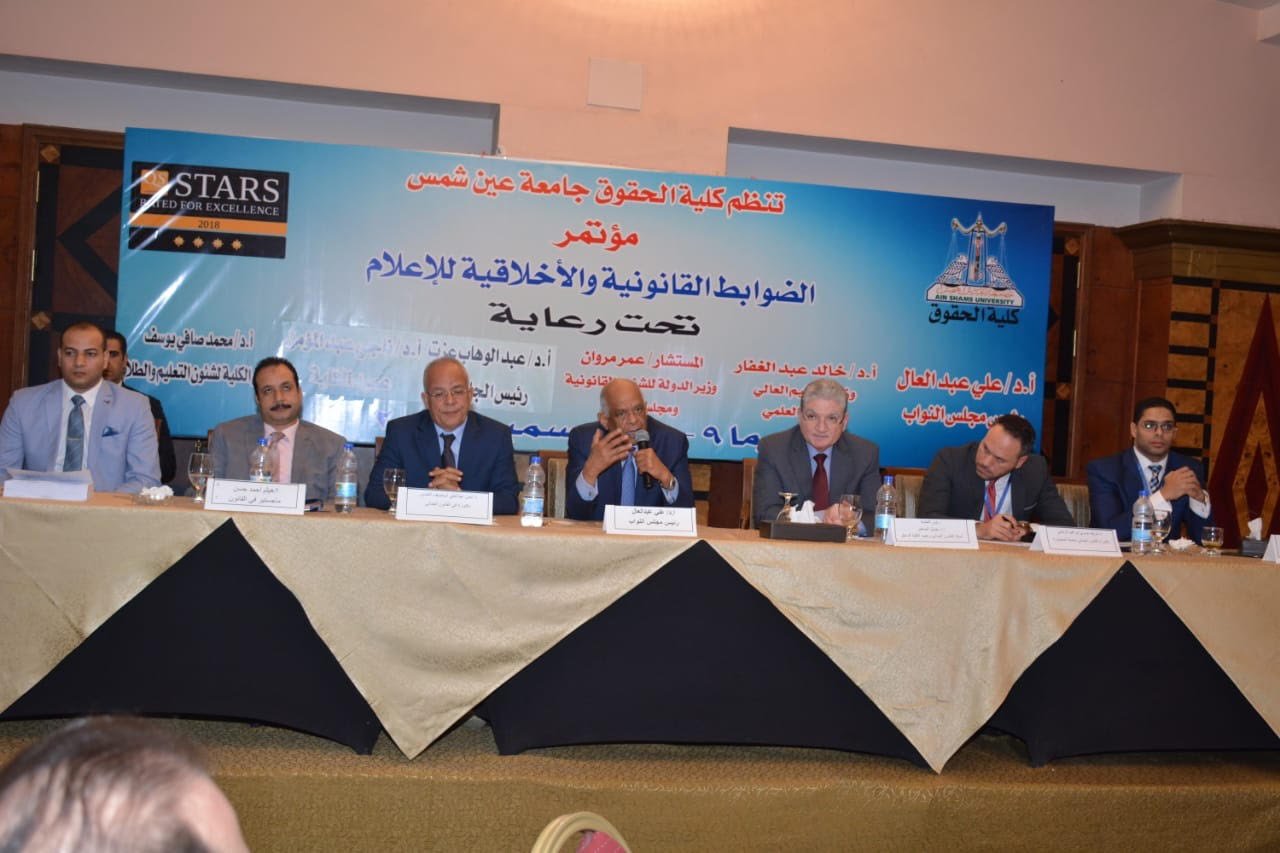Recommendations of the Conference of Legal and Ethical Controls at the Faculty of Law
The Faculty of Law, Ain Shams University, held its annual conference from 9 to 10 December 2018 at the Triumph Hotel in Heliopolis. The conference included six sessions devoted respectively to the legal and legislative controls of the media, civil responsibility for media abuses and responsible freedom of the media and its role in spreading Legal awareness, media, foreign investment and sustainable development, the rules of international law relating to information, and criminal liability for media abuses.
The participants exchanged views and discussions on the topics of the conference, which was run by a series of distinguished professors of law, respectively, in the sequence of meetings: Prof. Taha Awad Ghazi, Prof. Dr. Hossam El-Din Kamel El-Ahwani, Prof. Dr. Rabie Anwar Fateh El Bab, Prof. Dr. Hazem Attlem, and Prof. Dr. Gamil Abdel Baki.
The meeting was held under the patronage of Prof. Dr. Ali Abdel-Aal, Speaker of the Chamber of Deputies, Prof. Dr. Khaled Abdel-Ghaffar, Minister of Higher Education and Scientific Research, Counselor Omar Marwan, Minister of State for Legal Affairs and the House of Representatives. Dr. Mohammed Safi, Vice Dean for Education and Students Affairs, and Dr. Ehab Youssir Anwar, Vice Dean for Graduate Studies and Research
The proceedings and discussions of the conference "Legal and ethical controls of Media" ended with the following recommendations
To consolidate the original values of Egyptian society, including the inviolability of private life, warning against attacks on social media sites, and other new media.
Second: The need to respect the internal and international charters in the field of freedom of thought, opinion and expression, especially those based on respect for religions and citizenship rights.
Thirdly, the importance of the participation of academic centers and institutions in the field of media in the Arab world in developing strategic plans for the bodies and the media, with its distinguished academic expertise and its knowledge of the global events and crises affecting the Arab world.
Fourth: Preparing national information policies that define priorities and chart the means to achieve the desired goals, since the media does not produce development, but paves the way for it.
Fifth: The need to establish a mechanism for coordination and cooperation between the media organs of the state and the government in its various ministries concerned to spread the culture of sustainable development among the public.
Sixth: Activating the role of the media in disseminating the knowledge that contributes to creating the social climate that supports development and does not stand in the way of achieving it.
Seventh: To deal with the phenomenon of legal ignorance in light of the tremendous technological development, by promoting a culture of respect for the law and commitment to its application in society through the development of an integrated media plan based on the definition of law and its importance and working to raise legal awareness in society.
Eights: Establishment of an information room at the General Authority for Investment, next to the website, to enhance its presence in the media arena.
Ninth: The need to search for a mechanism to confront the media that broadcast from abroad information materials that threaten national security or public order.
Tenth: Activating the role of the state to confront disinformation, by using technological means that help in verifying the source of disinformation, so as not to violate freedoms, under the pretext of confronting deception, and does not leave misleading on the pretext of non-violation of freedoms.
Eleventh: Cooperation between the public and private sectors to provide the legislative environment and infrastructure necessary for the development of the Internet and its uses, while activating the role of participation in local and international seminars and conferences specialized in this field.
Twelfth - To appeal to the Egyptian legislator to deal firmly with the media abuses, and in order to do so we recommend that the provisions of the laws governing the work of the media on the following:
1 - Criminalizing the negative act of media professionals to refrain from addressing the abuse of the guest against others, and to prevent the continuation of such abuses.
2. Appeal to the Egyptian legislator to tighten the criminal sanctions on the media that go beyond its work and cause damage to its followers.
3. The legislator calls for the speedy promulgation of the executive regulations of the laws 178,179, 180 of 2018 so that the executive authority can perform its duties fully, and to complete the system of work in the media in the proper manner and in accordance with the true law.
4. The legislator's appeal to issue a law on e-commerce and digital transactions, as well as his appeal for the speed of the issuance of a law on electronic media.
5. Recommendation of the Egyptian legislator should issue legislation that governs and determines the televising of criminal trials and the legality of cameras entering courtrooms during the course of their proceedings.
6. The legislator's appeal for the necessity of enacting special legislation regulating the dissemination of information and election campaigns during the election periods in the same manner as the recent media legislation, taking into account the international standards contained in international covenants and treaties that guarantee the protection of freedom of opinion and expression, For citizens with transparency and objectivity.
7. Establishing specialized courts to deal with media cases, such as specialized courts in various fields such as economic courts, intellectual property courts, etc., which face the enormous activity, harmful behavior of the channels through which they are exceeded, and the support of those who are harmed in obtaining their rights under a framework of justice. .
.svg)

